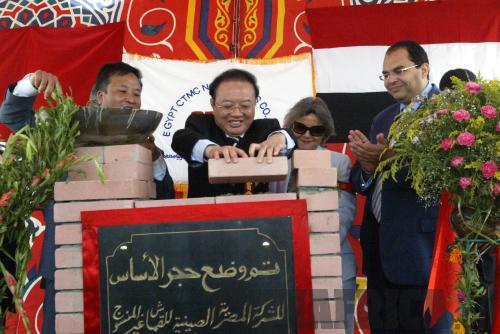| 
Among his many titles, which include honorifics like Secretary General, Vice Minister and Ambassadorial Commercial Counselor, Africa Expert may be the best tag for Wei Jianguo.
While he has held a variety of positions during his 37-year-long career, Wei's most significant work has been in facilitating Sino-African economic exchange.
Last year he published an autobiography about his experiences. His hope is that the book can help Chinese readers learn more about the continent, when he shares his story with ChinAfrica.
A choice
Living in Africa was like a dream that never was.
Chinese industry was weak when Wei was in high school. Passionate about science, he was determined to dedicate himself to the nation's industrialization.
But as he waited to be admitted to a local university where he would study technology, destiny was approaching. He was offered the opportunity to study French abroad. The move would be fully funded by the state.
Pursuing his dream or seizing an opportunity – these were Wei's options. He weighed the choices again and again until he finally made up his mind.
"I believed that my ambition should be in line with the needs of the country," said Wei. "I didn't choose my fate; it picked me. But I have no regrets at all about that."
After graduation, Wei was placed in the Ministry of Foreign Trade, now known as the Ministry of Commerce. It was 1972. The next year he journeyed to Africa. Since then, he has traveled around the continent's 54 countries and resided in Morocco, Tunis and Gabon for about 20 years.
Assistance
While Wei lived in Africa for decades, he has yet to contract malaria. He believes this luck is a "favor of life." But he is perpetually aware of the struggle surrounding him, and spends a lot of time promoting an antimalarial that is Chinese made since the 1980s. Its success rate across the continent is significant, and Wei recalled meeting a pregnant woman who had named her baby after the medication.
Ever since, he has been firmly devoted to helping Chinese medical enterprises enter the African market.
"I used to emphasize the prospective promise of medications," said Wei. "Medicine could ultimately have a market share of 1 billion dollars, but money is not our final goal. We want to help Africans to get rid of their aches and pains."
According to Wei, the Chinese have built about 2,300 km of railways, seven airports, 42 stadiums and over 100 schools around Africa. And he remembers every detail.
He attributes these efforts to the fact that, as he put it, China and Africa are like brothers who share battle scars. The Chinese, he said, want to help wholeheartedly – no political strings attached.
"We come to assist with a notion of equality and mutual benefit rather than to bestow charity," he said.
More exchange
When Wei first began his work in the 1970s, his colleagues informed him that China's main task in Africa was foreign assistance. Trade wouldn't be of great consequence. But Wei didn't think so.
At a meeting with senior leaders in 1993, Wei ventured forth the idea that China had not lent to Sino-African trade the consideration it deserved. His suggestion prompted an important visit of Chinese high-level officials in Sino-African diplomatic history.
The influence is obvious. In the following decades, Wei witnessed a burst of Sino-African trade and economic cooperation. The volume of trade soared, with a more than 100-fold increase over 16 years. Africa is now China's main export and import market.
But Wei understands that export surpluses at that time were by no means a win-win scenario. A century ago, overwhelming imports were disastrous to Chinese domestic economic development.
"We should import more from African countries," he said.
Meanwhile, Wei believes that Africa is a great investment for Chinese private enterprises. But Chinese enterprises should keep in mind this investment should be based on equality and mutual benefit, said Wei.
Unemployment on the continent, he suggested, can be remedied by labor-intensive industries and joint ventures with local businesses. Technology should be transferred to help foster self-sufficiency.
"It's 10 times harder to make money in Africa than in Europe," said Wei. "But friendship weighs much more than money." |